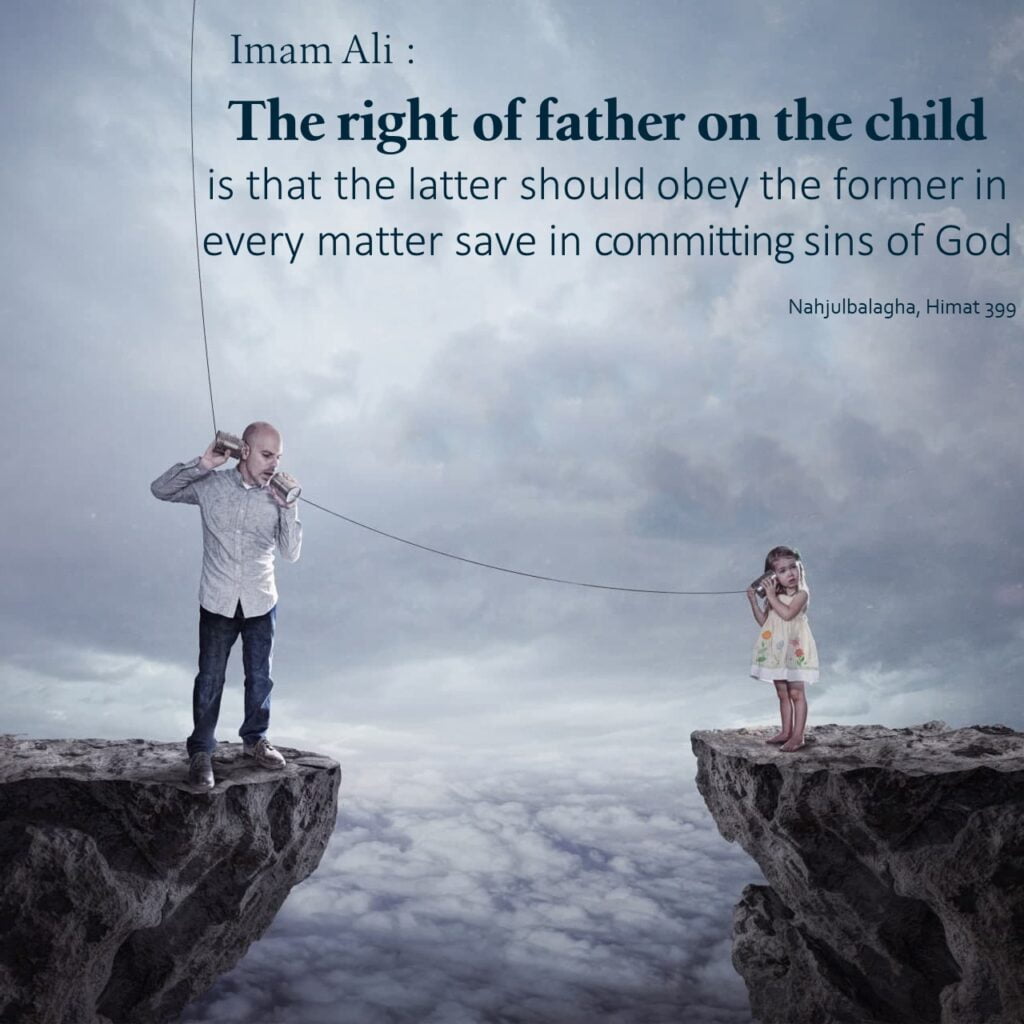
Master of the faithfuli
حقُّ الوالِدِ عَلَى الوَلَدِ أن يُطيعَهُ في كُلِّ شَيءٍ إلاّ في مَعصيَةِ اللّهِ سُبحانَهُ
The right of father on the child is that the latter should obey the former in every matter save in committing sins of God
📚Nahjulbalagha, Hikmat 399
Introduction
Respecting and honoring one’s parents holds great significance in various cultures and religions across the globe. In Islamic teachings, the concept of filial piety is deeply rooted, with the Quran and the sayings of the Prophet Prophet Muhammad PBUH emphasizing the importance of honoring and obeying parents. One renowned hadith from Imam Ali PBUH reveals the profound nature of this duty. Additionally, Professor Raefipour further elucidates the significance of parental respect in connecting with figures of spiritual authority, such as Ahl al-Bayt (the family of the Prophet Muhammad PBUH). In this article, we will delve into the meaning and implications of these teachings.
The Hadith’s Message
Imam Ali PBUH, the son in law and cousin of the Prophet Muhammad PBUH, and the first Imam after Him (s), is well famous for his wisdom and knowledge. The hadith highlights the duty of a child towards their father. It states that apart from disobeying God (committing sins) children ought to obey their fathers in all matters. This underscores the authority and respect that parents hold in the upbringing and guidance of their children. By adhering to this, children not only uphold the rights of their parents but also gain valuable lessons in discipline, patience, obedience, and moral behavior, and as the result, levl up and move towards Allah.
Understanding the Status of Parents
Professor Raefipour expands on the importance of understanding the significance of one’s parents in the journey towards spiritual enlightenment. He asserts that to truly comprehend and appreciate the value of Ahl al-Bayt, one must recognize the profound meaning behind the phrase “may my father and mother be sacrificed for you!” found in prayers. By reflecting on this expression, individuals are encouraged to reflect on the sacrifices and love their parents have provided throughout their lives.
Connecting with Ahl al-Bayt
The professor aptly points out that without comprehending the significance of our own parents and their role in shaping our lives, it becomes challenging to truly connect with figures of spiritual authority such as Ahl al-Bayt. The phrase “I and Ali are fathers of this Ummah” emphasizes the role of spiritual guides, like Imam Ali, as caring and nurturing figures for the Muslim community. However, without recognizing the role of our mortal parents, it becomes difficult to understand and appreciate this spiritual responsibility.
Honoring Imperfect Parents
Despite the inherent flaws and imperfections that every parent possesses, Professor Raefipour encourages individuals to perform a “maneuver” by respecting their fallible parents as a means of seeking a connection with the infallible Ahl al-Bayt. This wise guidance suggests that even if our parents may have made mistakes or have shortcomings, it is still our duty to show them love, respect, and forgiveness.
Conclusion
Honoring and respecting parents is a fundamental duty ingrained in Islamic teachings. The hadith attributed to Imam Ali and the insights provided by Professor Raefipour underscore the importance of acknowledging and respecting the role of parents in our lives. By doing so, we not only fulfill our moral obligations but also pave the way to connect with figures of higher spiritual authority. Understanding the profound love and sacrifices made by our parents allows us to truly appreciate the extent of devotion we express when we say “may my father and mother be sacrificed for you!” Sure ly, by extending this respect to our parents, we deepen our spiritual journey, opening pathways towards enlightenment and unity with Ahl al-Bayt. Honoring and respecting imperfect parents becomes an opportunity for growth and self-reflection. It allows us to cultivate patience, forgiveness, and empathy. Recognizing their efforts and sacrifices reminds us of the unconditional love that parents provide, and in turn, inspires us to reciprocate and exhibit kindness and gratitude towards them.
Moreover, honoring our parents is not limited to mere obedience and respect; it also encompasses taking care of their physical, emotional, and financial needs as they age. Islam places a strong emphasis on the virtues of caring for one’s parents during their elderly years. This duty brings us closer to the teachings and practices of Ahl al-Bayt, as their guidance was rooted in compassion, empathy, and maintaining strong family ties.
In conclusion, the hadith attributed to Imam Ali and the insights shared by Professor Raefipour shed light on the importance of respecting and honoring our parents. By acknowledging their impact on our lives and recognizing their sacrifices, we not only fulfill our duties as children but also embark on a spiritual journey that leads us towards Ahl al-Bayt. Let us strive to be grateful, compassionate, and dutiful towards our parents, for in doing so, we strengthen our connection to the divine and cultivate a harmonious and loving society.
Important Notes:
- The hadith emphasizes the duty of obeying and respecting parents, excluding sin against God.
- Understanding the significance of “may my father and mother be sacrificed for you!” is crucial in connecting with Ahl al-Bayt.
- Respecting imperfect parents is essential in seeking a connection with the infallible Ahl al-Bayt.
FAQ
| Question | Answer |
|---|---|
| Why is respecting parents important? | Respecting parents is a fundamental duty in Islamic teachings and enables a stronger spiritual connection. |
| What does the hadith tell us? | The hadith highlights the duty of obeying parents in all matters except for sin against God. |
| Why should we understand the significance of our own parents? | Understanding and appreciating our parents’ sacrifices allows for a deeper connection with figures of higher spiritual authority. |
| Do we need to respect imperfect parents? | Yes, despite their flaws, respecting imperfect parents is essential in seeking a connection with the infallible Ahl al-Bayt. |
A Poem: Respecting Fallible Parents
Respecting fallible parents, a virtuous way,
To prepare ourselves, to serve Imam Mahdi, we say.
For in honoring those whom God bestowed,
We seek the path, where love and devotion flowed.
Though they’re imperfect, making mistakes in stride,
Their guidance and wisdom should never be denied.
With humility, patience, and hearts full of grace,
We embrace their teachings and seek their embrace.
For in respecting our parents, we learn a great deal,
Preparing ourselves to serve with genuine zeal.
It is through their love and sacrifices we find,
The strength to serve the Imam and humankind.
Imam Mahdi, the infallible parent we revere,
His guidance and blessings ever so near.
With gratitude and respect for our earthly kin,
We strive to serve, eradicate vice and sin.
So, let us treasure our fallible parents dear,
And with their noble lessons, persevere.


